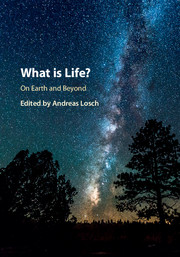
- Cited by 7
-
Cited byCrossref Citations
This Book has been cited by the following publications. This list is generated based on data provided by Crossref.
Losch, Andreas 2019. Planetary sustainability: transitions of an idea. International Journal of Astrobiology, Vol. 18, Issue. 6, p. 592.
Dunér, David 2019. Biosignatures for Astrobiology. p. 303.
Losch, Andreas 2019. The need of an ethics of planetary sustainability. International Journal of Astrobiology, Vol. 18, Issue. 3, p. 259.
Peters, Ted 2021. Astrobiology. p. 17.
Peters, Ted 2022. Will Superintelligence Lead to Spiritual Enhancement?. Religions, Vol. 13, Issue. 5, p. 399.
2024. Origin of Life via Archaea. p. 1.
Chon-Torres, Octavio Alfonso Chela-Flores, Julian Dunér, David Persson, Erik Milligan, Tony Martínez-Frías, Jesús Losch, Andreas Pryor, Adam and Murga-Moreno, César Andreé 2024. Astrobiocentrism: reflections on challenges in the transition to a vision of life and humanity in space. International Journal of Astrobiology, Vol. 23, Issue. ,
- Publisher:
- Cambridge University Press
- Online publication date:
- July 2017
- Print publication year:
- 2017
- Online ISBN:
- 9781316809648


